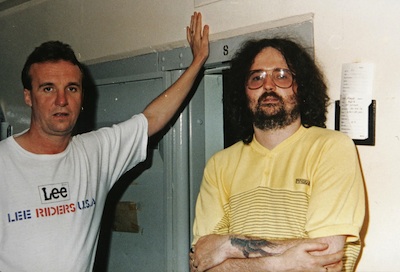
by Anthony McIntyre (for the Pensive Quill)
Yesterday, 36 years after his original conviction, Pat Livingstone was acquitted of killing Samuel Llewellyn in West Belfast in 1975. Mr Llewellyn, a resident of the Shankill Road, was shot dead by the IRA after being kidnapped while carrying out emergency repairs to homes in the area in the wake of a loyalist bomb attack. It became known as the “Good Samaritan killing”.
Looking at a photograph of ‘Big Liv’ yesterday after his acquittal was soothing, seemingly far removed from the days when it was customary for a West Belfast man to merely turn up in a suit and as a result be labelled ‘the accused.’
Now the worm has turned and Liv stands vindicated, able to point the finger at those who conspired to unjustly secure a worthless conviction. The accused in the case of Samuel Llewellyn are the British judiciary and the RUC.
It was clear to everybody remotely interested from the outset that the charge against Pat Livingstone was tenuous to say the least. Convicted on a concocted verbal statement he was fallaciously said to have made outside the jurisdiction of the RUC, it was easy after that for the legal process that disposed of unwanted members of the public to grind into action. Equipped with neither brake nor reverse gear, the conveyor belt trundled on relentlessly until justice had been pulverised. Prejudice not evidence was sufficient to call it in a Diplock Court.
Other than immediate family few cared about an unsafe conviction. Immediately after the Llewellyn killing Pat Livingstone had been the target of a smear campaign by members of the Provisional Movement making it clear to all and sundry that it was hanging him out to dry. Livingstone was a former internee so it was all too easy to presume his culpability rather than prove it. Conferring on him the status of an unwanted member of the public made it all the easier to remove him from public view. Journalists were whispered to from Provisional offices and when the judge sentenced him to serve the rest of his natural life in prison, (illegally as well), there was a collective shrug of indifference. ‘Throw away the key’ was the cry from the British and unionist establishment, made sufficiently loud to drown out the sound of other concerns.
In prison Liv endured the ardours of the blanket protest and because of the sentence he received was unable to attend the funeral of his 14 year old sister Julie who was brutally killed by British state forces the same evening Frank Hughes died on hunger strike.
I never met him during the blanket. We were held throughout in separate blocks. Once it was over, we became close prison friends. Not of the temperament to be academically inclined – that type of discipline had little appeal to him – he was extremely intelligent. Armed with an encyclopaedic knowledge he sustained himself throughout his lengthy spell of imprisonment by reading every type of literature, an activity he combined with following the progress of Glasgow Celtic whom he adored. He was wickedly sarcastic and the two of us shared a wry perspective on jail matters, rarely showing the slightest inclination to take at face value anything from officialdom, whether Provisional or penal.
Once coming back from the visits in 1982 in a prison van he was being dropped off at his block before me. As he was about to get out he turned around and backed out, gesturing to Willie McGrath of Kincora infamy while commenting to me ‘don’t get out with your arse facing him.’ Whether the prisoners or the screws guarding us laughed most is still something I have yet to figure out. But that was Liv, quick and never one to miss an opportunity to make a witty remark.
On rare occasions in our lives we have written to each other, usually when the chips were down for one or the other. That affinity would never have stopped him ripping the back out of me. Typical Liv, just his way, as natural and as frequent as Irish rain.
There was no justification for the killing of Samuel Llewellyn. A non combatant, he happened to be in the wrong place at the wrong time. What his family thought they knew about his death has now been shattered by the combined efforts of the RUC and British judiciary in securing a verdict for which there was no justification. Its role often overlooked, the northern judiciary was complicit in crimes against society and it is unfortunate that no proper investigation has ever been conducted into its role. The judiciary was as cavalier about law and rights as Anglo Irish bankers were about the economy. And now the relentless determination of a former blanket man has, in the court of public opinion, moved judges from the bench to the dock.
![[Irish Republican News]](https://republican-news.org/graphics/title_gifs/rn.gif)
![[Irish Republican News]](https://republican-news.org/graphics/title_gifs/harp.gif)

